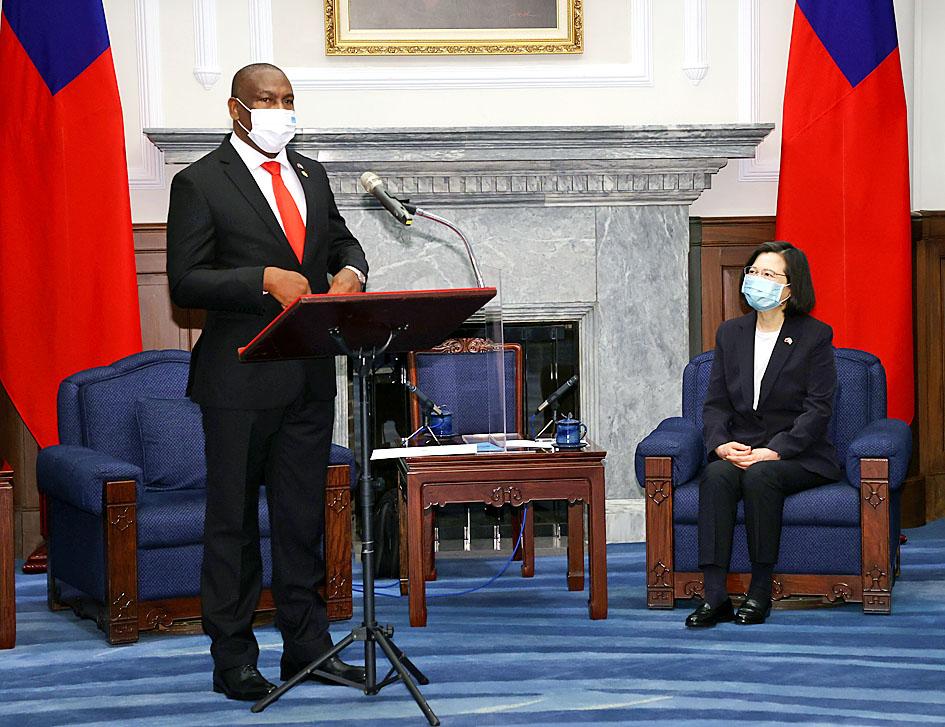President Tsai Ing-wen (蔡英文) yesterday welcomed Saint Lucia’s new ambassador to Taiwan, as Robert Kennedy Lewis presented his credentials to her.
At the ceremony, Tsai said that Lewis’ extensive political experience, including serving as Saint Lucia’s minister of education, would serve him well in the post.
“He can help deepen relations between the two countries,” Tsai said, adding that Lewis, who has visited Taiwan several times, is an “old friend.”

Photo: CNA
Taiwan and Saint Lucia have closely cooperated over the years in such areas as agriculture and education, Tsai said, adding that her visit to the Caribbean nation in 2019 helped to bolster ties between them.
Tsai asked the ambassador to convey her greetings to acting Saint Lucian Governor-General Errol Charles and Saint Lucian Prime Minister Philip J. Pierre.
Lewis said that he was extremely honored to serve as Saint Lucian ambassador to Taiwan.
The two countries are island nations known for their friendliness and hospitality, he said, adding that they have a shared respect for such common values as rule of law, democracy, freedom, equality and peace.
Lewis thanked Taiwan for providing assistance to Saint Lucia over the past 20 years, especially in the areas of agriculture, education, public health, business and corporate services.
More than 120 Saint Lucian students are studying in Taiwan, he said, adding that he hopes Taiwan continues to provide learning opportunities for his country’s doctors, young scholars, students and other professionals.
Taiwan first established diplomatic relations with Saint Lucia in 1984, although ties were severed from 1997 to 2007.
Separately, the Ministry of Foreign Affairs yesterday said that Taiwan is not sending an official delegation to next week’s inauguration ceremony of South Korean president-elect Yoon Suk-yeol due to the COVID-19 pandemic, but would instead send representatives from Taiwan’s office in Seoul.
Ministry spokeswoman Joanne Ou (歐江安) said that the government wanted to send a delegation led by the legislative speaker to Tuesday’s ceremony, which is to take place in the plaza in front of the National Assembly in Seoul.
As COVID-19 outbreaks in Taiwan and South Korea would require delegation members to quarantine for seven days upon returning, Taipei decided against the idea after consulting with lawmakers, Ou said.
The Taipei Mission in Korea would instead send officials to the ceremony, she said.
Former legislative speaker Wang Jin-pyng (王金平) led a delegation to the 2013 inauguration of former South Korean president Park Geun-hye.
When South Korean President Moon Jae-In’s inauguration was held in May 2017, no overseas guests were invited, as he assumed office the day after the election.

POSITIVE DEVELOPMENT: Japan and the US are expected to hold in-depth discussions on Taiwan-related issues during the meeting next month, Japanese sources said The holding of a Japan-US leaders’ meeting ahead of US President Donald Trump’s visit to China is positive news for Taiwan, former Japan-Taiwan Exchange Association representative Hiroyasu Izumi said yesterday. After the Liberal Democratic Party’s landslide victory in Japan’s House of Representatives election, Japanese Prime Minister Sanae Takaichi is scheduled to visit the US next month, where she is to meet with Trump ahead of the US president’s planned visit to China from March 31 to April 2 for a meeting with Chinese President Xi Jinping (習近平). Japan and the US are expected to hold in-depth discussions on Taiwan-related issues during the

‘LIKE-MINDED PARTNER’: Tako van Popta said it would be inappropriate to delay signing the deal with Taiwan because of China, adding he would promote the issue Canadian senators have stressed Taiwan’s importance for international trade and expressed enthusiasm for ensuring the Taiwan-Canada trade cooperation framework agreement is implemented this year. Representative to Canada Harry Tseng (曾厚仁) in an interview with the Central News Agency (CNA) said he was increasingly uneasy about Ottawa’s delays in signing the agreement, especially as Ottawa has warmed toward Beijing. There are “no negotiations left. Not only [is it] initialed, we have three versions of the text ready: English, French and Mandarin,” Tseng said. “That tells you how close we are to the final signature.” Tseng said that he hoped Canadian Prime Minister Mark Carney

President William Lai (賴清德) yesterday bestowed one of Taiwan’s highest honors on Saint Vincent and the Grenadines (SVG) Ambassador Andrea Clare Bowman in recognition of her contributions to bilateral ties. “By conferring the Order of Brilliant Star with Grand Cordon on Ambassador Bowman today, I want to sincerely thank her, on behalf of the Taiwanese people, for her outstanding contribution to deepening diplomatic ties between Taiwan and SVG,” Lai said at a ceremony held at the Presidential Office in Taipei. He noted that Bowman became SVG’s first ambassador to Taiwan in 2019 and

A man walks past elementary school artworks at the Taipei Lantern Festival in Ximen District yesterday, the first day of the event. The festival is to run from 5pm to 10pm through March 15.